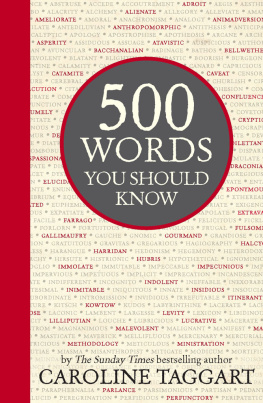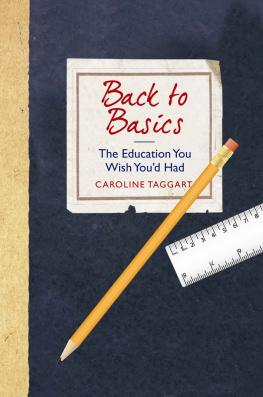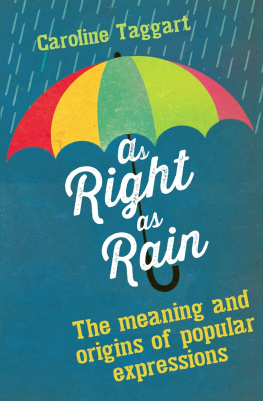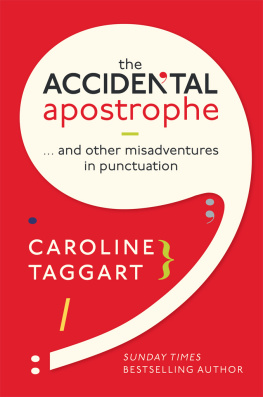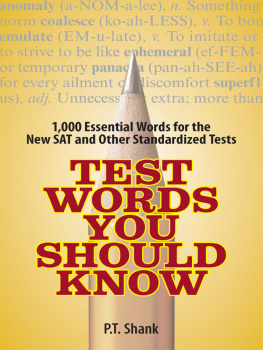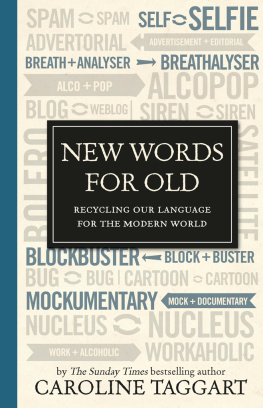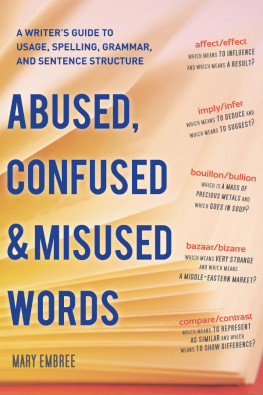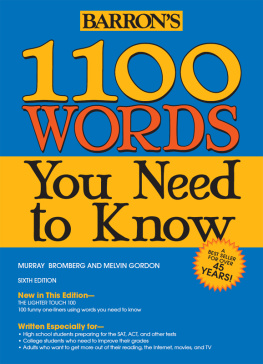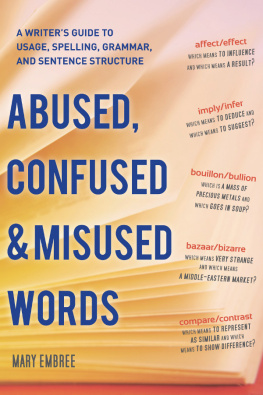

First published in Great Britain in 2014 by
Michael OMara Books Limited
9 Lion Yard
Tremadoc Road
London SW4 7NQ
Copyright Michael OMara Books Limited 2014
All rights reserved. You may not copy, store, distribute, transmit, reproduce or otherwise make available this publication (or any part of it) in any form, or by any means (electronic, digital, optical, mechanical, photocopying, recording or otherwise), without the prior written permission of the publisher. Any person who does any unauthorized act in relation to this publication may be liable to criminal prosecution and civil claims for damages.
A CIP catalogue record for this book is available from the British Library.
ISBN: 978-1-78243-294-4 in hardback print format
ISBN: 978-1-78243-298-2 in e-book format
Typeset by K.DESIGN, Winscombe, Somerset
www.mombooks.com
This is a book for the logophile the lover of words. When selecting words to include, I deliberately avoided the technical, the highly specialized and the overly obscure. You will seek in vain in these pages for adiabatic, haptotropism or phosphorylation; nor will you find byssus, facinorous or thigmophilic. My attitude to the former group is that if you need to know them you probably know them already and to the latter that you are not easily going to work them into your day-to-day conversation.
Come to think of it, you wont find logophile here either.
No, what I have tried to do is pick things that made me think, Ooh, thats a nice word (an approach, I may tell you, that played havoc with my reading and my conversation for a number of weeks). Most of my 500 choices will be familiar, at least vaguely, to most of you. They may include words you have forgotten you knew, or words you are uncomfortable about using because you arent 100 per cent sure of their meaning. Our media dont always help us in this regard. Words, of course, do change their meaning with the passage of time and some of those I have written about seem to have been given a new lease of life lately, not necessarily through being used correctly..
If this book has any instructive purpose, its to help you to work out the meanings of unfamiliar words through their similarity to familiar ones. If you know, for example, that anthropology is the study of humankind, you can begin to have a guess at what a with chewing.
But really this is not a book that is intended to teach or to preach. Yes, it aims to help you use words correctly and to enrich what I am sure is already a rich vocabulary. Most of all, however, it hopes to stop you briefly in your tracks as you flick through its pages and say, as I have done, Ooh, thats a nice word.
Between us, we can keep logophilia alive and well.
Caroline Taggart
May 2014

The compliments and accolades included here range from admiration of intellect to appreciation of sexual attraction, but its intriguing that this should be the shortest chapter in the book. Are we really so unimaginative when it comes to being nice to people? Even this brief list includes attributes that become boring or annoying if taken too far.
adroit
History or word usage at least has a long-standing prejudice against left-handedness: gauche (the French word for left) is used in English to mean physically clumsy or socially inept, whereas sinister (the Latin) is well, sinister. There is even the word gaucherie, meaning an awkward or tactless remark. On the other side of the coin, as it were, we have dextrous (from the Latin for right), meaning the very opposite of clumsy, likely to take a catch that the gauche person would have dropped, and adroit (from the French), adept, tactful, immune from the awkwardness and tendency to gaffes that characterize the gauche person. To make matters worse, a tactless or unsubtle person may also be described as maladroit: badly right.

aspiration
To aspire to something is to long to achieve it, particularly if it may be beyond your reach: He aspires to be CEO of a company, but he has neither the brains nor the charisma. Such a desire is an aspiration: To become a CEO has always been his greatest aspiration.

assiduous
You can take assiduity too far someone who didnt return your affection wouldnt thank you for being assiduous in your attentions but on the whole it is a good thing, meaning hard-working and persevering. An assiduous researcher is one who isnt put off by a lack of early success, while an assiduous reader spends every available moment with a book. Reading is a particularly appropriate thing to do assiduously, as the word comes from the Latin for to sit down to, with the sense of putting your nose to the grindstone.

avuncular
Literally pertaining to an uncle: affectionate and helpful to someone younger. The word is usually applied not to the young persons relatives but to a family friend or perhaps an older boss. There is no suggestion of impropriety here: He had an avuncular attitude to the childrens antics simply means he enjoyed watching them and didnt object to their jumping on the furniture; when they were a bit older he might take an avuncular interest in their careers, recommending them to friends who might employ bright young things.
As for a female equivalent, the OED gives materteral, but describes it as humorous and rare; its clearly been made up by someone who has a of Latin and thinks there darn well ought to be a word. In the modern, non-Latin-speaking world, youre probably safer sticking to the unexciting auntly if you want people to know what you mean.

benevolent
Not a million miles from benign (see under ), this literally means well-wishing but has a sense of being more active than that not only well-wishing but doing something about it. A benevolent dictator doesnt just sit around smiling. Nor, come to that, does the opposite: a malevolent dictator is much more likely to instigate an invasion or conduct a purge than he is to stay in the office scowling.

burgeoning
To burgeon is to grow healthily and rapidly, to flourish. Originally used of plants, it can now refer to anything from Brazils burgeoning economy to a burgeoning romance or a burgeoning interest in social reform.

callipygian
You might not often need a word for having a nice backside, but when you do, this is it. In fact its one of two: you might prefer callipygous. The stress in both words is on the pyg; in callipygian the g is pronounced as a j; in
Next page
